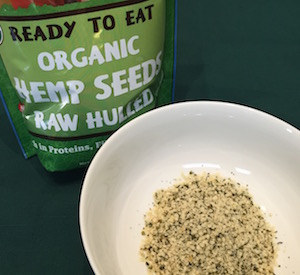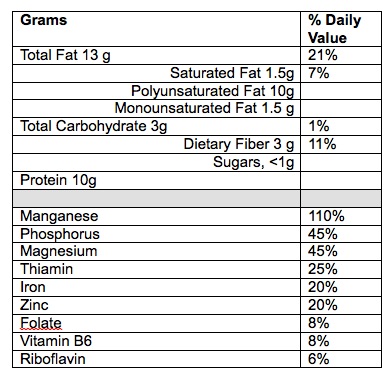
Hemp Seeds: The Perfect Food!
Hemp is a common term for high-growing varieties of the herb, cannabis sativa, and its products. The versatile hemp plant is grown not only for food but also for oil, resin, wax, rope, fabric, paper, pulp and biofuel. Hemp foods are made from a variant of the cannabis plant in which the psychoactive ingredient in marijuana, THC or tetrahydrocannabinol, is so low it is non-detectable.
The primary edible part of the hemp plant are its seeds. Raw shelled hemp seeds, also known as hemp hearts, can be eaten as is or made into protein powder, oil, flour and milk. The seeds are packed with high quality protein, healthy fat, fiber, and have anti-inflammatory properties. Since they are eaten raw, they retain their enzymes, vitamins, minerals, antioxidants and chlorophyll.
In just 3 tablespoons (30g) of hemp seeds you get 13 grams of fat, 3 grams of carbohydrates and 10 grams of protein. In addition, hemp seeds are loaded with manganese, phosphorus, magnesium, thiamin, iron and zinc. See the table below based on the nutrition data from Carrington Farms.

Protein:
Hemp seeds contain 33% protein and all 10 essential amino acids, making them a complete protein. According to professional vegan triathlete and author, Brendan Brazier, hemp is more alkaline than most proteins so is a great protein source if you are balancing your pH. In addition, hemp has anti-inflammatory properties namely due to an amino acid, edestin, that is an integral part of DNA. Brendan says that “it makes hemp the plant source closest to our own amino acid profile.”
Healthy fats:
Hemp seeds provide the perfect ratio (3:1) of Omega-6 to Omega-3 essential fatty acids. In 3 tablespoons you’ll get 7.5 g of Omega-6 and 3g of Omega 3. Omega-6 is pro-inflammatory and most Americans get way too much of it. Omega-3s on the other hand are anti-inflammatory. Read more about why you want to avoid inflammation.
Easy to digest:
Raw hemp protein retains naturally-occurring enzymes which make it easy to digest and absorb. Hemp milk is easier to digest than soy milk. Dr. Andrew Weil states that “hemp milk contains no oligosaccharides, complex sugars that can cause flatulence if not properly broken down during digestion” unlike soy milk.
Allergies?
According to Dr. Weil, “As far as allergies are concerned, hemp seeds and nuts do not pose the threat that tree nuts do. Similarly, anyone allergic to soy or dairy should be able to safely consume hemp milk.”
How to use:
Sprinkle hemp hearts or protein powder on your oatmeal or other cereal, in salads, soups and in smoothies. Hemp oil is dark green with a nutty flavor and makes a great salad dressing base. See our recipe for Chia, Flax, & Hemp Seed Pudding – a great way to start the day. Serve with hemp milk, sliced bananas and fresh berries!
